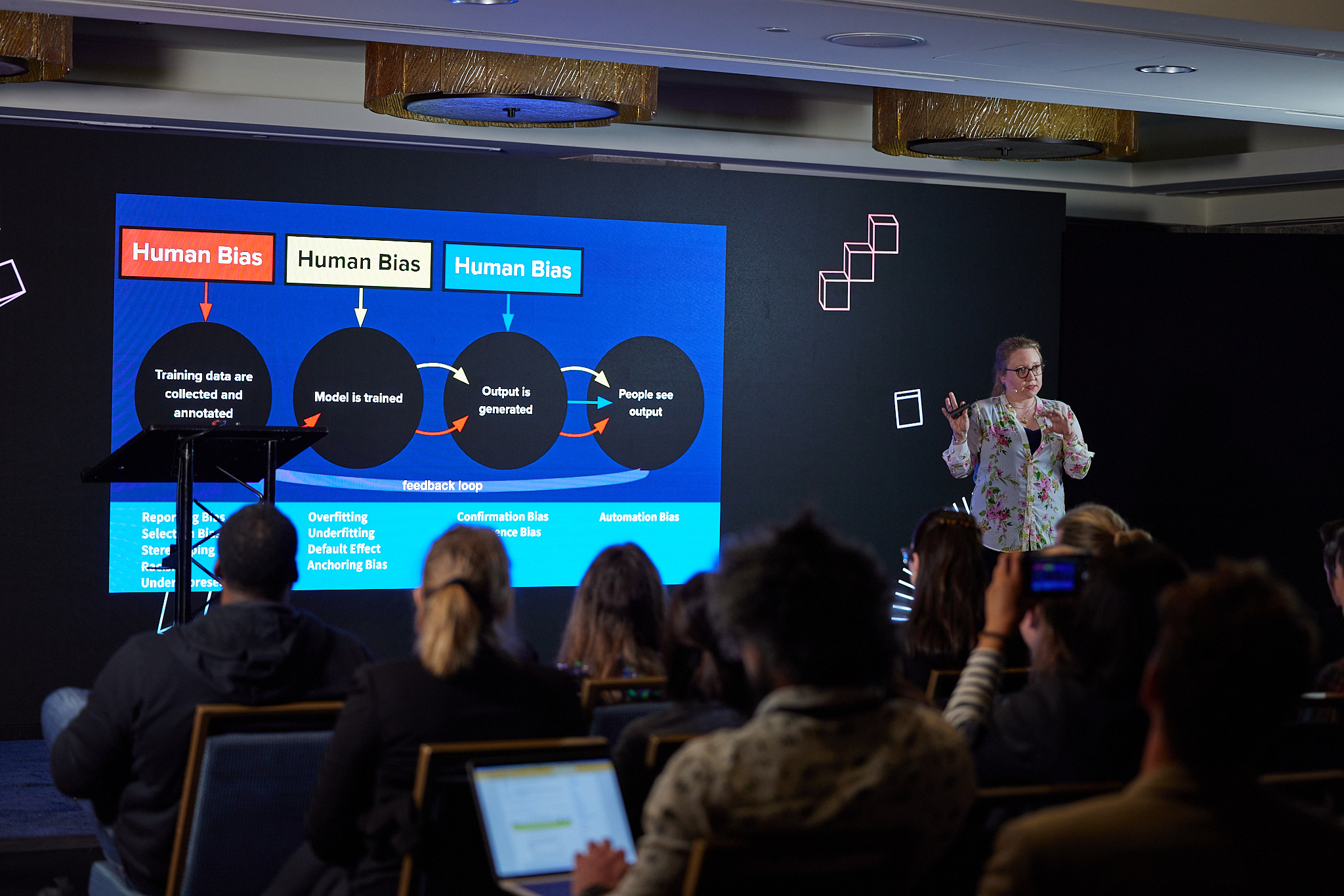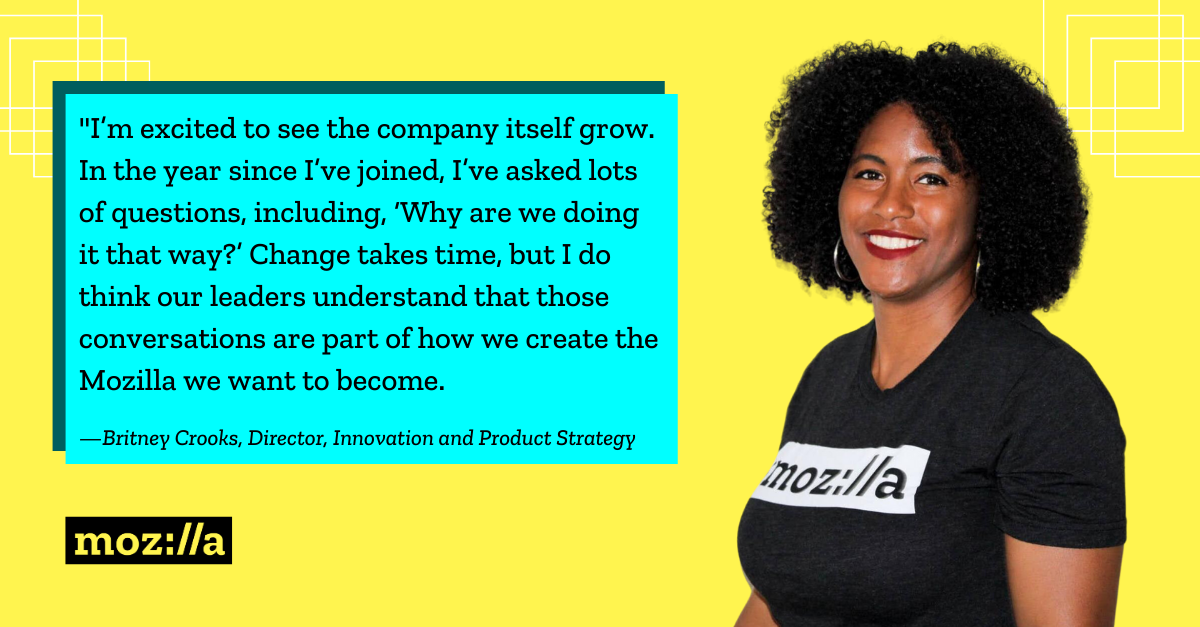From banking to blockchain and Silicon Valley to Nigeria, Britney Crooks’ career has been a study in exploring new spaces. Now, she’s leading a whole team of explorers as director of product strategy and innovation at Mozilla’s innovation ecosystem team. Below, Britney reflects on the path that led her to Mozilla, explains how she and her colleagues identify and examine new ideas, and shares what she’s excited about — including the first-ever Responsible AI Challenge.
What does Mozilla’s Innovation Studio do?
Our team’s job is to look at the spaces that are growing and that we want to explore, and then think about the products and experiences Mozilla may want to create or provide. What’s happening in AI, for example? What do we want to understand? Mozilla is still relatively small — the company is fewer than 1,000 people — and that gives us room to think really big.
When I joined about a year ago, we did an exercise to identify categories — looking at market trends, startup activity and generally the questions people around us were asking. Content creation is one area we explored. We looked at podcasting, because it’s a difficult space to monetize but yet an activity that a large audience engages in. We looked at how to reduce the toxic engagement we see today on social media. Influencer marketing isn’t an obviously Mozillian space, but it’s huge. We couldn’t ignore that it’s there and that we need to understand that audience in order to know how to support them.
I think so far, the most fun part for the team has been getting hands-on with customer research. It’s exciting to get that direct feedback: ”Yes, I’d use that,” or “Adding this feature would help.” That allows us to better understand the opportunity to build, how to run experiments and what validation points we need to see, and the business model we could create around a product as it evolves.
Tell us about your background and why you joined the team.
I’m very numbers-oriented, and I wanted to figure out how the business world works. But I quickly realized that I’m also a breadth-over-depth person. I admire people who can flex different muscles, like an engineer who then leads a marketing team. And I wanted to better understand tech. So I did a leadership development rotation at Microsoft, which gave me the chance to understand how the business operates while being exposed to many different functions. Then I went to business school, and during that time I spent three months in Nigeria working for a tech company, which was such a memorable experience.
After school, I worked at a smaller software company, and then went to Accenture in part because it was two blocks from home! My role involved biz dev, investing, and blockchain, none of which I knew much about — but it turned out to be the perfect fit in so many ways. One of my strengths is connecting people with the information they need, and it was key to my success. I also traveled all over the world. And then after George Floyd was killed, I jumped into designing and developing programs specifically for Black or African American people in tech, which can be so rare in corporate America. At the same time I kept my ecosystem edge to be an executive for our Black Founders Development Program. That year was rewarding, but it was a different type of hard. It gave me a new appreciation for what DE&I leaders do every day. This is definitely an experience I’ll take with me into all the work I do.
Then when the Innovation Studio at Mozilla was starting up last year, this role popped up. I’d always wanted to shape products, and I liked that I could use my background in startups and emerging tech — take that gritty, zero-to-one, blank-sheet-of-paper approach — and still grow my career. I also wanted to work at a company that cares about doing right by the people it serves, especially in this moment where AI is moving so quickly. This is a potential turning point for the web, and that’s both scary and exciting,which means we need to be intentional.
How do you think about your role as a leader?
I’m always solving for multiple things at once — that’s part of what’s so rewarding and challenging about being a manager. I’m thinking strategically about how the org should be structured and how to move toward our broader goals, and I’m also thinking about the needs of each team member. What roadblocks do we need to remove or rules do we need to break to keep people from getting stuck? And how can I balance the clarity they want around their job description with the ambiguity and flexibility that comes naturally with innovating? How do we customize projects and opportunities for individuals, so they’re all doing more of what they enjoy?
I’m also thinking about their career growth. I always tell my team members, “If you’re not more valuable when you leave this team than when you joined it, I did something wrong.” It’s about creating those opportunities — whether it’s exposure, whether it’s an external resource — to get them ready for their next step.
I also think a lot about how to tap into people’s creativity but make sure they don’t burn out. I have a couple of people on a sprint this week, for example, and they’re very excited and sending messages at 11 p.m. We absolutely want to support that passion — but if they kept that up week after week, they’d be exhausted. So we create the space to go deep on topics when there is something to chance but also the space to step back to protect our energy and our peace. That is something I really appreciate about Mozilla is the understanding that we’re human. We have the flexibility to work at the times and paces that work for us.
Tell us about the Responsible AI Challenge. How did it come about?
The challenge is one of several ideas we designed to explore AI, but we didn’t necessarily expect to action it so soon. But the space is evolving so quickly, and we needed to jump in. As we say on our team: Action leads to insight more often than insight leads to action. And as we reviewed the applications, it was so exciting to see the things people are tackling. Some were thinking about foundational issues like how to improve the data and tune the models; some were thinking about applications in health and elder care that can help protect vulnerable populations; some were thinking about how AI can enable more sustainable farming. I also love the global representation of our finalists — we received more than 250 applications from 47 countries, including India, Ethiopia, Ghana, and South Africa, as well as the U.S. and U.K.

Dr. Margaret Mitchell discussed how human bias affects AI technology at Mozilla’s Responsible AI Challenge event in San Francisco in May 2023. Credit: Mozilla
We announced the three winners on May 31, and the finalists joined us in San Francisco for a day of talk and project pitches. The lineup was amazing — Gary Marcus, who’s an ethicist at NYU; the author Kevin Roose; and Meg Mitchell, who was a research scientist at Google and is now chief ethics scientist at Hugging Face. I honestly didn’t know what to expect when we started planning this project, and I’m very grateful for the caliber of people we were able to convene and for the conversation we were able to create.
What are you looking forward to as your team and Mozilla evolve?
I’m excited to see Innovation Studio itself grow. We have seven people now, along with some from other teams who are working with us full-time, and we’re hiring. But I’m also excited to see how we source more ideas from the ecosystem beyond our team. Everything we learned from the AI Challenge will be part of that; I’m looking forward to hearing what people need, what they’ve tried, what they’re thinking about. I expect we’ll spin up new projects based on those conversations, and I hope we can build together with other builders in the ecosystem.
Then as we move into full-run mode, I’m excited for those moments where we launch a product in the market and get to take a step back and watch the impact and experiences we create. Getting to see this thing you dreamed of become true as a team, and just as important what we will learn from those moments to further refine our processes.
I’m excited for our team members, too, because they’re going to have such a level of ownership over the things we build. If you come in as the full-stack engineer on a project, for example, that means you decide the roadmap, the technical architecture, the tools you’ll use. I think we’re going to see significant growth.
And I’m excited to see the company itself grow. In the year since I’ve joined, I’ve asked lots of questions, including, “Why are we doing it that way?” Change takes time, but I do think our leaders understand that those conversations are part of how we create the Mozilla we want to become.
Interested in joining our team? Check out our open roles. |
